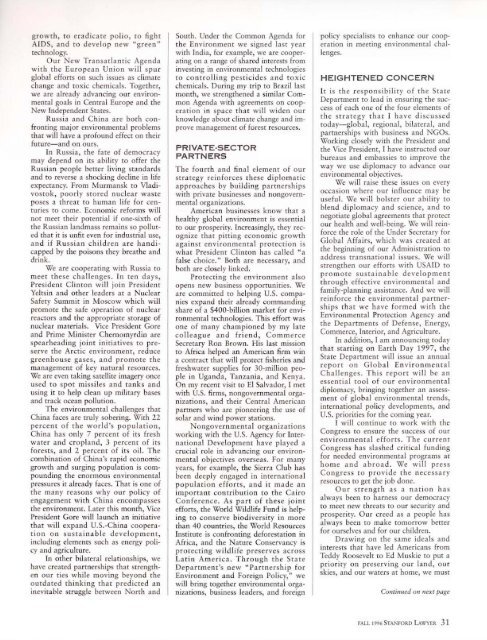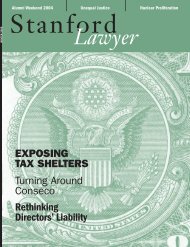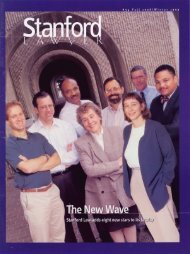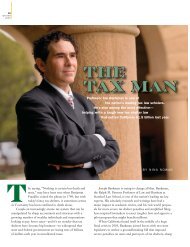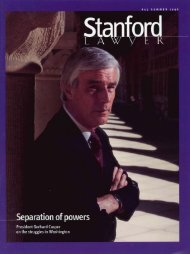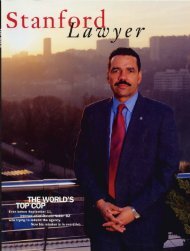Fall 1996 – Issue 50 - Stanford Lawyer - Stanford University
Fall 1996 – Issue 50 - Stanford Lawyer - Stanford University
Fall 1996 – Issue 50 - Stanford Lawyer - Stanford University
You also want an ePaper? Increase the reach of your titles
YUMPU automatically turns print PDFs into web optimized ePapers that Google loves.
growth, to eradicate polio, to fight<br />
AIDS, and to develop new "green"<br />
technology.<br />
Our New Transatlantic Agenda<br />
with the European Union will spur<br />
global efforts on such issues as climate<br />
change and toxic chemicals. Together,<br />
we are already advancing our environmental<br />
goals in Central Europe and the<br />
New Independent States.<br />
Russia and China are both confronting<br />
major environmental problems<br />
that will have a profound effect on their<br />
future-and on ours.<br />
In Russia, the fate of democracy<br />
may depend on its ability to offer the<br />
Russian people better living standards<br />
and to reverse a shocking decline in life<br />
expectancy. From Murmansk to Vladivostok,<br />
poorly stored nuclear waste<br />
poses a threat to human life for centuries<br />
to come. Economic reforms will<br />
not meet their potential if one-sixth of<br />
the Russian landmass remains so polluted<br />
that it is unfit even for industrial use,<br />
and if Russian children are handicapped<br />
by the poisons they breathe and<br />
drink.<br />
We are cooperating with Russia to<br />
meet these challenges. In ten days,<br />
Pre ident Clinton will join President<br />
Yeltsin and other leaders at a uclear<br />
Safety Summit in Moscow which will<br />
promote the safe operation of nuclear<br />
reactors and the appropriate storage of<br />
nuclear materials. Vice President Gore<br />
and Prime Minister Chernomyrdin are<br />
spearheading joint initiatives to preserve<br />
the Arctic environment, reduce<br />
greenhouse gases, and promote the<br />
management of key natural resources.<br />
We are even taking satellite imagery once<br />
used to spot missiles and tanks and<br />
using it to help clean up military bases<br />
and track ocean pollution.<br />
The environmental challenges that<br />
China faces are truly sobering. With 22<br />
percent of the world's population,<br />
China has only 7 percent of its fresh<br />
water and cropland, 3 percent of its<br />
forests, and 2 percent of its oil. The<br />
combination of China's rapid economic<br />
growth and surging population is compounding<br />
the enormous environmental<br />
pressures it already faces. That is one of<br />
the many reasons why our policy of<br />
engagement with China encompasses<br />
the environment. Later this month, Vice<br />
President Gore will launch an initiative<br />
that will expand U.S.-China cooperation<br />
on sustainable development<br />
including elements such as energy poIi:<br />
cy and agriculture.<br />
In other bilateral relationships, we<br />
have created partnerships that strengthen<br />
our ties while moving beyond the<br />
outdated thinking that predicted an<br />
inevitable struggle between North and<br />
South. Under the Common Agenda for<br />
the Environment we signed last year<br />
with India, for example, we are cooperating<br />
on a range of shared interests from<br />
investing in environmental technologies<br />
to controlling pesticides and toxic<br />
chemicals. During my trip to Brazil last<br />
month, we strengthened a similar Common<br />
Agenda with agreements on cooperation<br />
in space that will widen our<br />
knowledge about climate change and improve<br />
management of forest resources.<br />
PRIVATE-SECTOR<br />
PARTNERS<br />
The fourth and final element of our<br />
strategy reinforces these diplomatic<br />
approaches by building partnerships<br />
with private businesses and nongovernmental<br />
organizations.<br />
American businesses know that a<br />
healthy global environment is essential<br />
to our prosperity. Increasingly, they recognize<br />
that pitting economic growth<br />
against environmental protection is<br />
what President Clinton has called "a<br />
false choice." Both are necessary, and<br />
both are closely linked.<br />
Protecting the environment also<br />
opens new business opportunities. We<br />
are committed to helping U.S. companies<br />
expand their already commanding<br />
share of a $400-billion market for environmental<br />
technologies. This effort was<br />
one of many championed by my late<br />
colleague and friend, Commerce<br />
Secretary Ron Brown. His last mission<br />
to Africa helped an American firm win<br />
a contract that will protect fisheries and<br />
freshwater supplies for 30-million people<br />
in Uganda, Tanzania, and Kenya.<br />
On my recent visit to El Salvador, I met<br />
with U.S. firms, nongovernmental organizations,<br />
and their Central American<br />
partners who are pioneering the use of<br />
solar and wind power stations.<br />
Nongovernmental organizations<br />
working with the U.S. Agency for International<br />
Development have played a<br />
crucial role in advancing our environmental<br />
objectives overseas. For many<br />
years, for example, the Sierra Club has<br />
been deeply engaged in international<br />
population efforts, and it made an<br />
important contribution to the Cairo<br />
Conference. As part of these joint<br />
efforts, the World Wildlife Fund is helping<br />
to conserve biodiversity in more<br />
than 40 countries, the World Resources<br />
Institute is confronting deforestation in<br />
Africa, and the ature Conservancy is<br />
protecting wildlife preserves across<br />
Latin America. Through the State<br />
Department's new "Partnership for<br />
Environment and Foreign Policy," we<br />
will bring together environmental organizations,<br />
business leaders, and foreign<br />
policy specialists to enhance our cooperation<br />
in meeting environmental challenges.<br />
HEIGHTENED CONCERN<br />
It is the responsibility of the State<br />
Department to lead in ensuring the success<br />
of each one of the four elements of<br />
the strategy that I have discussed<br />
today-global, regional, bilateral, and<br />
partnerships with business and NGOs.<br />
Working closely with the President and<br />
the Vice President, I have instructed our<br />
bureaus and embassies to improve the<br />
way we use diplomacy to advance our<br />
environmental objectives.<br />
We will raise these issues on every<br />
occasion where our influence may be<br />
useful. We will bolster our ability to<br />
blend diplomacy and science, and to<br />
negotiate global agreements that protect<br />
our health and well-being. We will reinforce<br />
the role of the Under Secretary for<br />
Global Affairs, which was created at<br />
the beginning of our Administration to<br />
address transnational issues. We will<br />
strengthen our efforts with USAID to<br />
promote sustainable development<br />
through effective environmental and<br />
family-planning assistance. And we will<br />
reinforce the environmental partnerships<br />
that we have formed with the<br />
Environmental Protection Agency and<br />
the Departments of Defense, Energy,<br />
Commerce, Interior, and Agriculture.<br />
In addition, I am announcing today<br />
that starting on Earth Day 1997, the<br />
State Department will issue an annual<br />
report on Global Environmental<br />
Challenges. This report will be an<br />
essential tool of our environmental<br />
diplomacy, bringing together an assessment<br />
of global environmental trends,<br />
international policy developments, and<br />
U.S. priorities for the coming year.<br />
I will continue to work with the<br />
Congress to ensure the success of our<br />
environmental efforts. The current<br />
Congress has slashed critical funding<br />
for needed environmental programs at<br />
home and abroad. We will press<br />
Congress to provide the necessary<br />
resources to get the job done.<br />
Our strength as a nation has<br />
always been to harness our democracy<br />
to meet new threats to our security and<br />
prosperity. Our creed as a people has<br />
always been to make tomorrow better<br />
for ourselves and for our children.<br />
Drawing on the same ideals and<br />
interest that have led Americans from<br />
Teddy Roosevelt to Ed Muskie to put a<br />
priority on preserving our land, our<br />
skies, and our waters at home, we must<br />
Continued on next page<br />
FALL <strong>1996</strong> STANFORD LAWYER 31


